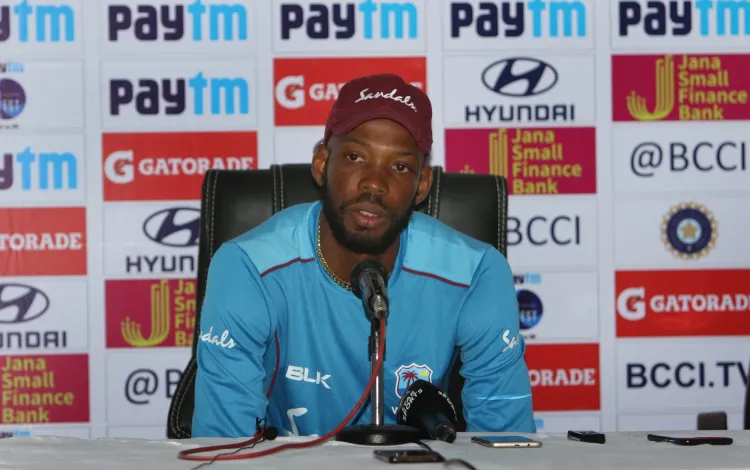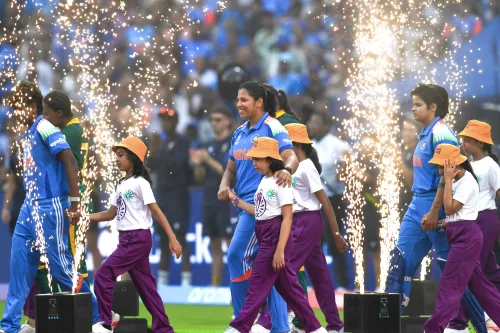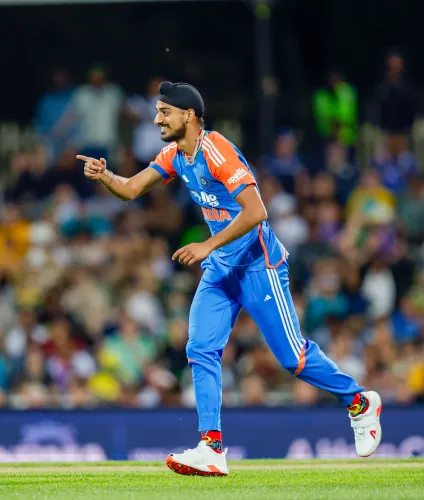Did Roston Chase Slam Umpiring Decisions After West Indies’ Loss to Australia?

Synopsis
Key Takeaways
- Roston Chase expressed frustration over umpiring decisions impacting the match.
- Chase called for more accountability from officials for clear errors.
- Key moments included controversial dismissals of Chase and Hope.
- Australia's Pat Cummins suggested umpiring decisions often balance out.
- West Indies dropped seven catches, hindering their performance.
Bridgetown, June 28 (NationPress) The newly appointed Test captain of the West Indies, Roston Chase, has expressed his deep dissatisfaction with the quality of umpiring during the team's 159-run loss to Australia in the inaugural Test. He feels that a number of dubious calls greatly influenced the match's result.
Chase reiterated the remarks made by head coach Daren Sammy, who had criticized TV umpire Adrian Holdstock following several decisions that went against the home side.
“This match has been incredibly frustrating for both myself and the team, especially after we bowled Australia out for a fairly modest total. We felt quite good about that,” Chase stated post-match. “However, the number of questionable decisions that didn’t go our way was significant. As a player, you give everything you have and fight hard. When nothing is going your way, it can be disheartening.”
Chase highlighted critical moments in the match, including his own lbw dismissal despite evidence of a potential inside edge, and Shai Hope’s exit following a sharp catch by Alex Carey. These incidents affected the West Indies’ response to Australia’s 180.
“Shai Hope and I were progressing well, but then we faced some questionable decisions that really hindered our efforts to build a substantial lead on Australia’s total,” Chase added. “Anyone can clearly see how disappointing those decisions can be. We’re out there to win, giving our all, and it feels like the odds are stacked against us.”
The West Indies captain called for increased accountability among umpires, suggesting that officials should face repercussions for blatant mistakes.
“It’s frustrating because as players, we face severe penalties when we make mistakes. Yet, when officials make poor decisions, nothing seems to happen. They simply move on from a wrong call,” he expressed.
“These are individuals’ careers at stake. A single erroneous decision can have lasting consequences. The playing field should be level; when players err, they should be penalized just as umpires should be for clear mistakes.”
Chase pointed to a controversial low catch by Hope that dismissed Travis Head at 53, which was ruled not out, as another pivotal moment. “I believe this was a significant factor in the match because Shai and I were performing well. We also faced a similar catch that went against us in the first innings while bowling. The match score could have looked very different, but I don’t want to dwell on that,” he noted.
On the contrary, Australian captain Pat Cummins downplayed the controversy. “We appeal when we believe it’s close, utilize DRS, and leave the rest to the umpires,” Cummins said. “There are often many 50-50 calls in matches. Today, we missed a few that went against us. That’s just cricket; it tends to balance out.”
Apart from the umpiring issues, Chase acknowledged that the West Indies let themselves down in the field, having dropped seven catches throughout the Test. “There’s no justification for the dropped catches. We’ve been diligent in our practice, working hard on slip catches. Each day, we aim to catch at least 30 to 40. However, there’s a vast difference between practice and actual gameplay,” he commented.
“I believe it’s more of a mental aspect. Once one catch is dropped, players might become anxious and second-guess their catching skills, which can disrupt their focus. Nevertheless, once you drop one, it’s crucial to stay focused on taking the next one.”









